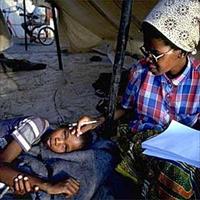SWAZILAND: Enough is enough, say nurses

Tired of being taken for granted, Swaziland's nurses have opted for industrial action after the government ignored a deadline to improve conditions of service.
After marching to the Ministry of Health and Social Welfare in the capital, Mbabane, on Friday to deliver their ultimatum, Swaziland's nurses registered their anger with an overtime ban beginning on Monday to protest delayed pay, unsafe working conditions, and crumbling facilities.
"We must start somewhere, so we've chosen the overtime issue," said Sibusiso Lushaba, secretary-general of the Swaziland Nurses Association (SNA). "As workers we have decided not to work the extra hours, as it is our right not to do so. This is not a strike; we have played our part as workers, but the employer does not want to meet their obligation."
Nurse Patricia Dlamini expressed some of the anger health workers feel. "Swaziland's nurses are a demoralised lot, and this comes from having so much to offer and so much knowledge and, I would say, love of the profession, but not being given the recognition we deserve. If we are unable to carry out our duties people suffer, people die. Why is that so hard for the authorities to understand?"
Beyond pay, issues of security are a real concern, especially for nurses working in remote clinics. "Nurses fear for their lives. We are not protected; there is no security in some clinics in the rural areas, no lights and no transport. Nurses are bludgeoned, robbed and raped. It makes you want to cry," said Nelsiwe Thwala, a nurse posted to a clinic in the rural Manzini region of central Swaziland.
Dangers of nursing
SNA released a table of 12 hospitals and clinics where nurses' quarters were burglarised, nurses assaulted and rapes committed. Top of the list was Hlatikhulu Government Hospital in Shiselweni, in the south of the country, where 20 nurses have suffered some form of criminal attack.
"The question that keeps on coming into our minds is: 'How many nurses should die before government takes us seriously?'" said Lushaba. A spokesperson for the Ministry of Health and Social Welfare told IRIN the ministry had no comment on the nurses' complaints.
The 2,016 nurses registered by the SNA, who have stayed in Swaziland rather than going abroad to work, have watched the deterioration of hospitals and clinics with dismay. Earlier this year, the Health Inspector of Mbabane declared the city's hospital, the largest in the country, unfit for human habitation.
In rural clinics an issue is a lack of water - the most basic of requirements. Often, none is available in the nurses' quarters or the clinics. It then becomes the nurse's duty to trek to streams to fetch containers of water for patients' use, cleaning and to operate toilets.
"When nurses complain they are ill-treated, and they thus are thinking of quitting the public service, it is because of this," said Lushaba.
 Back and Next - Back and Next
Back and Next - Back and Next See Also - See Also
See Also - See Also